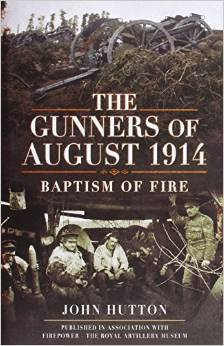“Here, in my view, lies the real story of the war.” Says John Hutton of his book on p.vii of the Preface. “First and foremost, it was an artillery war.”
Well, you don’t have to be Sherlock Holmes to work out that the artillery played a huge part in the Great War and this book is, as one might ascertain, about the British artillery in the 1914 campaign. It is a solid, workmanlike book and is readable and well written. John Hutton has used eyewitness accounts from a number of gunners held in the archive at the Royal Artillery museum, Woolwich. The book is a history of the events of 1914 from the mobilisation of the B.E.F to the end of the year, as seen by a few artillery men.
Hutton does not attempt to re-evaluate the 1914 campaign in any radical fashion; he simply re-tells the tale using the eyewitnesses to add the detail. The book contains the usual fare of ‘The Contemptible Little Army’, ‘fifteen rounds a minute’, the Christmas Truce and so on but to not include them would be like dropping the Christmas tree and turkey from the Christmas festivities. They have grown up as part of the story of 1914.
When I read a book that follows a well-trodden path I always hope to find something just that little bit different and in this instance I found the experience of ‘civilian’ horses particularly fascinating and informative. In the old memoirs written in the after days of the war one does get a sense of the closeness of the gunners to the horses in their teams. It is a subject rarely discussed in modern histories of the war so it is good to see the plight and life of the animals included. The way Hutton writes it the drafted horses were as troublesome in some cases as the returning reservists. The chapter that deals with the landing at Zeebrugge is really quite good. The book is divided into eleven chapters, has a short reference/source section and a good index but no bibliography. The maps are clear and there are some good photographs.
I have to say that the last chapter “The Shortage of Munitions” is an orphan. The reader is all of a sudden transported from the newly forming Western Front to the world of manufacturing and supply. The chapter does not fit in, appears to have been ‘bolted on’ and crucially it is not at all referenced. Therefore, the reader has no idea what books or sources Hutton has used to write this rather different chapter. It is a short, over-simplified, unsupported, rushed piece about the state of munitions manufacture and supply in the UK in 1914/15 and what was done to rectify the situation. I have written a PhD about munitions and supply in the Great War, therefore out of professional interest I would like to have seen reference to the sources Hutton used. The book really does not need this chapter at all. The story of munitions (and when the British government referred to munitions in the Great War it meant all war commodities not simply shells) is worthy of a book on its own.
Nor do I agree that the victory was down to the work of the gunners of 1914. Hutton says that the final victory “would be built on the shoulders of these first few gunners of the British Expeditionary Force”. The victory was an all arms affair, in fact by the end of the war the big guns had been left behind by the advancing allies. In the latter stages of the 100 Days campaign field guns were once again operating as single batteries or singletons up with the infantry in the line and often firing over open sights. Of course the artillery dominated the battlefield but victory was brought about by allied co-operation, all arms co-ordination, by a state of total war manufacturing in Britain and the vast industrial potential of America. The gunners were a part of it; they were not the whole of it.
Still, this all said; it’s worth a read.
Reviewed by Dr Wayne Osborne for War History Online
THE GUNNERS OF AUGUST 1914
Baptism of Fire.
By John Hutton.
Published by Pen & Sword, 2014.
Hardback, 215 pages.
ISBN 978 1 47382 372 3
